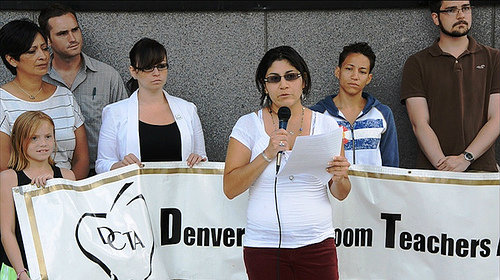

The district has agreed to tinker with the policy, but stands by its decisions. “Shocked” and “shattered” are some of the adjectives teachers used to describe their feelings when they found out in April their name was on the blacklist.
Kate Hoffman teaches 4th grade.
“My instruction led my students to the third highest median growth percentile in DPS,” she said at an emotional 10-hour board meeting in May.
Hoffman submitted evidence to the board: strong observation and student scores, and high marks from students and parents. She told the board the evaluation system is supposed to eliminate ineffective teachers.
“Instead, DPS is losing passionate, hard-working educators to a game of administrative politics,” she said.
When a teacher is evaluated, the district looks at several factors: student scores, principal and peer observations, professionalism and student perceptions. But during that May meeting, one after another, teachers complained that those criteria weren’t used. Instead, they believe school administrators are retaliating against them for speaking out at staff meetings, or asking too many questions.
Board member Jeannie Kaplan said she looked deeply into the data on many of the 80 cases.
“I’ve heard repeated themes after talking to many teachers, one of them is fear, that they’re afraid to say anything,” she said. “There’s retaliation. Any time a teacher speaks up, it seems that teacher is put on notice and is given disciplinary write-ups. If a teacher has indicated that he or she wishes to transfer schools, that teacher is given a disciplinary write up.”
Denver Schools are piloting a new teacher evaluation system called LEAP in some 150 schools. It involves trained peer observers giving feedback and support to teachers. In most cases, LEAP is reportedly working well. But this year, the spike in the number of teachers on the do-not-rehire list prompted an outcry. Dozens of first year teachers reported getting no evaluations and no support after repeated requests, while veteran teachers reported getting pushed out with no explanation.
“We’ve had too many situations here in which we’ve got first year teachers never had an observation,” said board member Andrea Merida, pounding her fists on the table. “And it’s not just this year, it’s been in previous years before. Never had an observation! And somehow this teacher manages to get non-renewed. I don’t know about you guys, but at my job, I’m suing if something like that happens to me.”
On Monday, teachers gathered at a press conference outside DPS headquarters.
“Our community needs to know that principals are given the power to destroy careers based on whim and not due process,” said blacklisted kindergarten teacher Melissa McKibben. “Where is their accountability?”
Later at the board meeting, DPS officials backed down -- partially. They agreed to permanently ban only the most “egregious” or criminal cases. But other teachers would be let back into classrooms only after teaching elsewhere successfully for three years.
“The notion that all of the sudden you’re going to go from very bad to very good is not very credible, and so I think what we want is a period of time where people can learn and grow and demonstrate successful performance,” said Superintendent Tom Boasberg.
Despite the outcry, Boasberg stands by the firings. And he stands by the reviews, calling them extremely careful.
“Fewer than a percent and a half of our teachers overall about whom we have such significant performance concerns, as a result of multiple observations as a result of student achievement scores, that we do not want next year in front of our kids in our classroom,” he said.
At the Monday meeting, board member Anne Rowe said it’s important to stop shuffling ineffective teachers from school to school.
“It wasn’t too long ago that an ineffective teacher could be removed from a school,” she said. “And we had that a number of times in my children’s school. And it broke my heart that I knew not only could they apply for a job, they were actually going to be placed in another Denver public school.”
But she said those decisions need to be based on a very solid body of evidence. Teachers on the blacklist argue that didn’t happen. Superintendent Boasberg doesn’t buy it.
“Some of these cases are simply not accurate and that in each case we are seeing very significant performance concerns about the individual teacher,” he said.
Board members hope to see an updated policy tonight, with more details about what the so-called “body of evidence” against a teacher should include.









